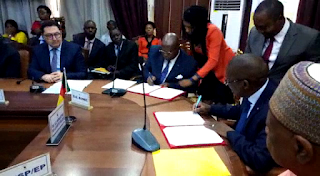Cameroon Urged To Investigate Deaths Amid Anglophone Protests
Eyong Blaise Okie in Buea
Four killed when police fire into air, as tensions rise in
English-speaking areas over perceived discrimination
International organisations are calling for an investigation in
Cameroon after four people were killed during unrest in the country’s
English-speaking regions.
Tensions have been brewing for the past month in Cameroon’s two
anglophone regions, where people say they are being treated as second-class
citizens.
What began as protests by lawyers against the use of French in courts
quickly spread to schools and universities after teachers agreed to strike over
the dominance of the French language.
In Bamenda, the country’s largest anglophone city, at least four people
were killed last week when security forces fired live ammunition in the air and
launched teargas into a market despite no evidence that there was a protest
taking place.
Amnesty International described actions as “excessive and unnecessary”,
and urged the Cameroonian government to find out who was responsible.
Ilaria Allegrozzi, Amnesty’s central Africa researcher, said:
“Responding to incidents of violence during protests with unnecessary or
excessive force threatens to further inflame an already tense situation and
could put more lives at risk.”
Local journalists say they have been harassed by the authorities and
that the plight of local communities has not been given coverage by state-controlled
media. On Monday, Zigoto Tchaya, a reporter working for France 24, was arrested
and held for a day after he interviewed Barrister Bobga, a prominent activist
based in Bamenda.
Nearly 200 miles south of Bamenda in Kumba – Cameroon’s second biggest
English-speaking city – schools, markets and transport systems ground to a halt
last week as angry residents took to the streets.
“Southern Cameroonians do not benefit anything from the French
Cameroon. We want this to end this year,” said Enow John, who had joined the
protest. Fellow protester Ni Achu said the movement was “ready to die for the
future of our children”.
Both Britain and France controlled parts of Cameroon until 1961, when
it gained independence and became a single country split into 10
semi-autonomous administrative regions.
Eight are francophone and adhere to French civil law. The remaining two
regions function under British common law, but anglophone Cameroonians say
their regions are underdeveloped and marginalised by the central government,
operating from the mainly French-speaking capital, Yaoundé.
“The 1998 law on the orientation of education clearly says that the two
sub-systems of education are independent and autonomous,” said Tassang Wilfred,
the secretary general of the teachers’ trade union in Cameroon. “[But] the
French system of education is the majority and has been trying to wipe out our
system of education, and that means wiping out our own cultural heritage.”
The protesters have been using Facebook and Twitter to organise.
Cameroonian musician Sama Ndango said online platforms served to amplify their
voices. “We have social media on our side – we are bigger than any government,”
Ndango wrote on Facebook.




Comments
Post a Comment